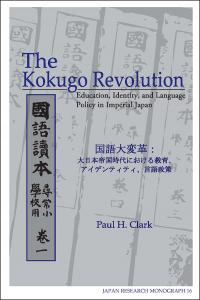The Kokugo Revolution
The Kokugo Revolution
Paul H. Clark
Through a study of the development of the Japanese national language, Paul H. Clark discusses reforms in the education system and the creation of a modern cultural identity in the Meiji era and beyond. The book begins with the varied early forms of spoken and written Japanese and goes on to explain how the colloquial version was promoted, especially by Ueda Kazutoshi, and became kokugo.
As a nonprofit academic press, we need your support to publish our books. Your gift can help us make more of our titles available as e-books. DONATE NOW
Title information
Through a study of the development of the Japanese national language, Paul H. Clark discusses reforms in the education system and the creation of a modern cultural identity in the Meiji era and beyond. The book begins with the varied early forms of spoken and written Japanese and goes on to explain how the colloquial version was promoted, especially by Ueda Kazutoshi, and became kokugo. It also demonstrates how language was used as a tool for social control and a means through which a greater sense of national unity was created as Japan careened toward total war with Asia. Source materials include interviews in addition to publications such as journals, books, newspapers, the official government gazette, and textbooks.
Paul H. Clark
Paul H. Clark is professor of history at West Texas A&M University. His research interests include pre-war Japan, Japanese culture, education, language, identity, and nationalism. He is the author of The Kokugo Revolution: Education, Identity and Language Policy in Imperial Japan (IEAS, 2009).
B.A., History, Baylor University; M.A., East Asian Languages and Culture, University of Kansas; Ph.D., East Asian History, University of Pittsburgh
The Kokugo Revolution (JRM 16)
Acknowledgments – vii
- 1. Introduction – 1
- 2. Writing, Literacy, Language Reform, and Education Reform in Early Meiji Japan – 12
- 3. Creating Kokugo Consciousness: Education Officials and the Emergence of National Language Ideology – 42
- 4. The Birth of the Genbun'itchi Movement and Futsūbun in the Middle Meiji Years – 62
- 5. Ueda Kazutoshi, Systemic Linguistics, and the Academic Legitimization of Kokugo – 78
- 6. The Genbun'itchi Society and the Establishment of the National Language Research Council – 107
- 7. Grammar, Textbooks, and the Implementation of the National Language – 133
- 8. Kokugo, the State, and Yamada Yoshio – 156
- 9. Conclusion – 174
Bibliography – 186
Index – 193

